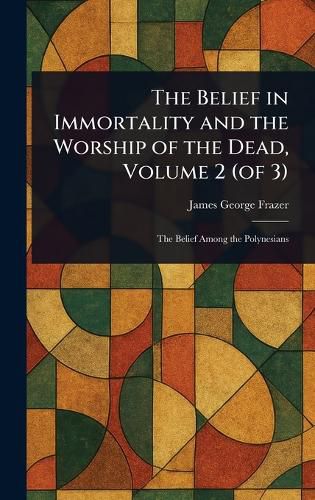Readings Newsletter
Become a Readings Member to make your shopping experience even easier.
Sign in or sign up for free!
You’re not far away from qualifying for FREE standard shipping within Australia
You’ve qualified for FREE standard shipping within Australia
The cart is loading…






This title is printed to order. This book may have been self-published. If so, we cannot guarantee the quality of the content. In the main most books will have gone through the editing process however some may not. We therefore suggest that you be aware of this before ordering this book. If in doubt check either the author or publisher’s details as we are unable to accept any returns unless they are faulty. Please contact us if you have any questions.
Explore the fascinating world of ancestor worship and death rituals in "Belief in Immortality and the Worship of the Dead, Vol. 2" by James George Frazer. This volume delves into the social customs and beliefs surrounding immortality prevalent in Oceania. A cornerstone of cultural anthropology, this meticulously prepared print republication offers insights into historical perspectives on social life, death, and the afterlife.
Frazer's detailed examination sheds light on the intricate relationship between the living and the dead, revealing the profound influence of ancestor worship on societal structures and individual lives. Discover the diverse traditions and practices that shaped communities in Oceania, offering a compelling glimpse into their understanding of mortality and the enduring human quest for immortality. A valuable resource for anyone interested in social history and the anthropological study of belief systems.
This work has been selected by scholars as being culturally important, and is part of the knowledge base of civilization as we know it.
This work is in the public domain in the United States of America, and possibly other nations. Within the United States, you may freely copy and distribute this work, as no entity (individual or corporate) has a copyright on the body of the work.
Scholars believe, and we concur, that this work is important enough to be preserved, reproduced, and made generally available to the public. We appreciate your support of the preservation process, and thank you for being an important part of keeping this knowledge alive and relevant.
$9.00 standard shipping within Australia
FREE standard shipping within Australia for orders over $100.00
Express & International shipping calculated at checkout
This title is printed to order. This book may have been self-published. If so, we cannot guarantee the quality of the content. In the main most books will have gone through the editing process however some may not. We therefore suggest that you be aware of this before ordering this book. If in doubt check either the author or publisher’s details as we are unable to accept any returns unless they are faulty. Please contact us if you have any questions.
Explore the fascinating world of ancestor worship and death rituals in "Belief in Immortality and the Worship of the Dead, Vol. 2" by James George Frazer. This volume delves into the social customs and beliefs surrounding immortality prevalent in Oceania. A cornerstone of cultural anthropology, this meticulously prepared print republication offers insights into historical perspectives on social life, death, and the afterlife.
Frazer's detailed examination sheds light on the intricate relationship between the living and the dead, revealing the profound influence of ancestor worship on societal structures and individual lives. Discover the diverse traditions and practices that shaped communities in Oceania, offering a compelling glimpse into their understanding of mortality and the enduring human quest for immortality. A valuable resource for anyone interested in social history and the anthropological study of belief systems.
This work has been selected by scholars as being culturally important, and is part of the knowledge base of civilization as we know it.
This work is in the public domain in the United States of America, and possibly other nations. Within the United States, you may freely copy and distribute this work, as no entity (individual or corporate) has a copyright on the body of the work.
Scholars believe, and we concur, that this work is important enough to be preserved, reproduced, and made generally available to the public. We appreciate your support of the preservation process, and thank you for being an important part of keeping this knowledge alive and relevant.